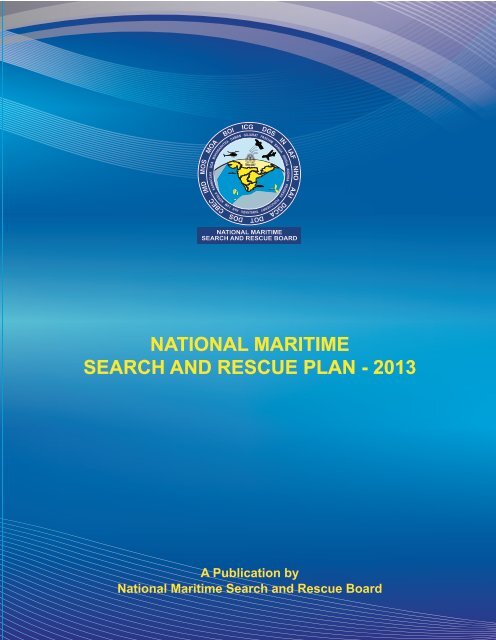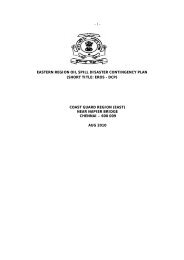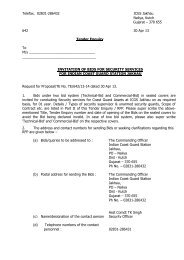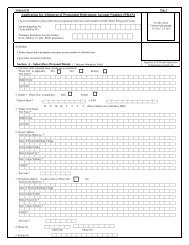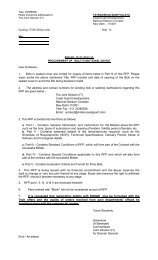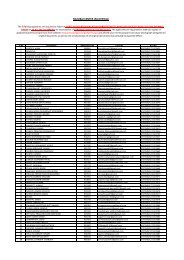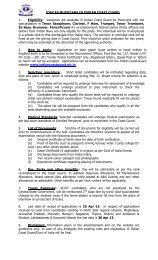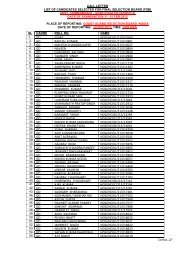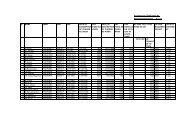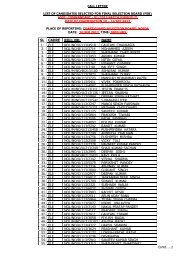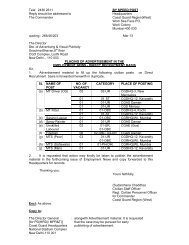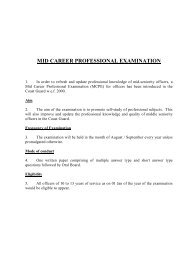SAR PLAN 2013.pmd - Indian Coast Guard
SAR PLAN 2013.pmd - Indian Coast Guard
SAR PLAN 2013.pmd - Indian Coast Guard
You also want an ePaper? Increase the reach of your titles
YUMPU automatically turns print PDFs into web optimized ePapers that Google loves.
NATIONAL MARITIME<br />
SEARCH AND RESCUE <strong>PLAN</strong> - 2013<br />
A Publication by<br />
National Maritime Search and Rescue Board
19<br />
Copy No. :<br />
NATIONAL MARITIME<br />
SEARCH AND RESCUE <strong>PLAN</strong> - 2013<br />
A Publication by<br />
National Maritime Search and Rescue Board
1<br />
REVISED NATIONAL MARITIME<br />
SEARCH AND RESCUE <strong>PLAN</strong> - 2013<br />
Policy<br />
1. It is the policy of the signatory agencies to provide a national plan for coordinating<br />
Maritime Search and Rescue (M-<strong>SAR</strong>) services to meet the national needs as well as regional<br />
and international commitments. Guidance for implementing this plan is amplified in the National<br />
Maritime Search and Rescue (<strong>SAR</strong>) manual, International Aeronautical and Maritime Search<br />
and Rescue (IAM<strong>SAR</strong>) manual and other relevant directives of the agencies to this plan.<br />
Purpose<br />
2. This plan construes by inter-agency agreement, the effective use of all available resources<br />
and facilities to assist persons and property in potential or actual distress at sea within the<br />
<strong>Indian</strong> Search and Rescue Region (ISRR) regardless of the nationality or circumstances in<br />
which that person is found.<br />
Terms and Definitions<br />
3. Following are the terms and definitions based on International Maritime Organization<br />
usage for M-<strong>SAR</strong>:-<br />
(a) <strong>SAR</strong> Coordinator. A person or agency with overall responsibility for establishing<br />
and providing <strong>SAR</strong> services within the SRR and ensuring that planning for those services<br />
is properly co-ordinated for which India is obliged under Maritime <strong>SAR</strong> Convention 1979.<br />
(b) Search and Rescue Region (SRR). An area of defined dimensions recognized<br />
by International Maritime Organisation (IMO) and International Civil Aviation Organisation<br />
(ICAO) or other cognizant international body and associated with a Rescue Co-ordination<br />
Centre, within which <strong>SAR</strong> services are provided.<br />
(c) Search and Rescue Sub-region (SRS). A specified area within a SRR<br />
associated with a rescue sub-centre.<br />
(d) <strong>SAR</strong> Services. The performance of distress monitoring, communication,<br />
coordination and <strong>SAR</strong> functions, including provision of medical advice, initial medical<br />
assistance or medical evacuation, through the use of public and private resources<br />
including co-operating aircraft, vessels and other craft and installations.
2<br />
(e) Maritime Rescue Co-ordination Centre (MRCC). A unit responsible for<br />
promoting efficient organisation of <strong>SAR</strong> services at sea and coordinating the conduct of<br />
maritime - <strong>SAR</strong> operations within a SRR.<br />
(f) Maritime Rescue Sub-Centre (MRSC). A unit subordinate to a MRCC<br />
established to complement the latter according to particular provisions of the responsible<br />
authorities.<br />
(g) Search and Rescue Unit (SRU). A unit composed of trained personnel and<br />
provided with equipment suitable for the expeditious conduct of search and rescue<br />
operations.<br />
(h) On-scene Co-ordinator (OSC). A person designated to co-ordinate <strong>SAR</strong><br />
operations within a specified area.<br />
(j) <strong>SAR</strong> Mission Co-ordinator (SMC). An official temporarily assigned to coordinate<br />
response to an actual or apparent distress situation.<br />
(k) Search and Rescue Point of Contact (SPOC). Rescue Co-ordination Centres<br />
and other established and recognized national points of contact which can accept<br />
responsibility to receive COSPAS-<strong>SAR</strong>SAT alert data to enable the rescue of persons<br />
in distress.<br />
(l) Mission Control Centre (MCC). Part of the COSPAS-<strong>SAR</strong>SAT System that<br />
accepts alert messages from the local user terminal(s) and other mission control centres<br />
to distribute to the appropriate Rescue Co-ordination Centres or other search and rescue<br />
points of contact.<br />
(m) Search and Rescue Data Provider (SDP). A source for a Rescue Coordination<br />
Centre to contact for obtaining data to support search and rescue operations,<br />
including emergency information from communications equipment registration<br />
databases, ship reporting systems and environmental data systems (e.g. weather or<br />
sea current).<br />
Objectives<br />
4. Having known the obligations under several international conventions, agreements and<br />
instruments to render assistance to persons in distress at sea and to the establishment of<br />
effective <strong>SAR</strong> services, the participating agencies to this plan recognise the need for co-operation<br />
and co-ordination of activities regarding safety on and over the sea and desire to :-<br />
(a)<br />
Provide a national plan for co-ordinating <strong>SAR</strong> services, effective use of all available
3<br />
resources, mutual assistance and efforts to improve such co-operation and services for<br />
greater protection of life and property with economy of effort.<br />
(b) Support in implementing the provisions of International Maritime <strong>SAR</strong> Convention<br />
1979 of IMO and other conventions to which India is or may become a party.<br />
Scope<br />
5. This plan is solely intended to provide internal guidance to all signatory agencies. No<br />
provisions of this plan or any supporting plan are to be construed in any way to contravene<br />
responsibilities and authorities of any participant as defined by statute, executive orders or<br />
international agreements or of established responsibilities of other agencies and organisations,<br />
which regularly assist persons and property in distress resulting from incidents. The participating<br />
members by signing this National Maritime <strong>SAR</strong> Plan, are obliged to fully extend all possible<br />
support and co-operation for effective conduct of <strong>SAR</strong> operations at sea.<br />
Participating Agencies<br />
6. The participating agencies to this plan are:-<br />
(a) Ministry of Shipping. Ministry of Shipping carries out broad responsibility<br />
w.r.t. Navigation and Port State Control of vessels and transportation safety. The Director<br />
General of Shipping, implementing agency for international conventions on maritime<br />
matters, shall promulgate all <strong>SAR</strong> preventive programmes on advise from the National<br />
Maritime <strong>SAR</strong> Board for commercial vessels operating in the <strong>Indian</strong> waters. They also<br />
maintain database of Maritime Mobile Service Identity (MMSI) numbers of all vessels<br />
registered with them.<br />
(b) <strong>Indian</strong> <strong>Coast</strong> <strong>Guard</strong>. <strong>Indian</strong> <strong>Coast</strong> <strong>Guard</strong> has been designated as the national<br />
coordinator for the conduct of maritime <strong>SAR</strong> operations on and over the sea areas of<br />
the <strong>Indian</strong> SRR. Towards this, the <strong>Indian</strong> <strong>Coast</strong> <strong>Guard</strong> develops, establishes, maintains<br />
and operates <strong>SAR</strong> facilities for maritime <strong>SAR</strong> operations. The operation is coordinated<br />
through Maritime Rescue Co-ordination Centres (MRCCs) and Maritime Rescue Sub<br />
Centres (MRSCs) located in maritime states of India.<br />
(c) <strong>Indian</strong> Navy. <strong>Indian</strong> Navy has facilities and resources that are used to support<br />
their own operations. These facilities may be used for maritime <strong>SAR</strong> needs on a ‘not-tointerfere’<br />
basis with military missions.<br />
(d) <strong>Indian</strong> Air Force. <strong>Indian</strong> Air Force has <strong>SAR</strong> facilities for their own operations<br />
over land and sea. These facilities may be used for maritime <strong>SAR</strong> needs on a ‘not-to-
4<br />
interfere’ basis with military missions.<br />
(e) Shipping Industry. Shipping industry operates a fleet of merchant ships for<br />
national use and promotes a safe merchant marine, which should assist and support<br />
when called upon in maritime <strong>SAR</strong> operations, in accordance with the national and<br />
international conventions and provisions.<br />
(f) Airports Authority. Airports Authority of India undertakes air traffic control and<br />
maintains flight service facilities and shall provide information to assist in maritime <strong>SAR</strong><br />
operations.<br />
(g) Meteorological Department. Meteorological Department shall support <strong>SAR</strong><br />
operations through timely input of weather messages, marine environment forecasts<br />
and warnings for the coastal and high seas and provide weather information on demand<br />
to co-ordinator and coordinating agency.<br />
(h) Department of Space (DoS). Department of Space (DoS) shall provide satellite<br />
“alert” services as per the guidelines of COSPAS-<strong>SAR</strong>SAT, for detection and location of<br />
aircraft, ships and individuals in potential distress situation that carry recommended<br />
distress beacons. DoS also maintains beacon registration data base, through web based<br />
access, containing unique identity of the beacon, vessel/aircraft type, owner and<br />
emergency contact details as provided by the users and also distributes the same to<br />
concerned rescue co-ordination centre for <strong>SAR</strong> mission planning.<br />
(j) Chief Hydrographer. Chief Hydrographer to Govt of India shall assist the<br />
maritime <strong>SAR</strong> agencies by timely promulgation of navigational warnings through<br />
NAVAREA and other measures.<br />
(k) Customs and Excise. Customs and Excise provide rescue facility assistance,<br />
and equipment clearance during <strong>SAR</strong> operation involving foreign crew / passengers.<br />
(l) Major Ports. Major Ports provide rescue facility assistance to the <strong>SAR</strong> agencies<br />
during <strong>SAR</strong> operations occurring near ports and offshore areas. The major ports shall<br />
also provide berthing, towing, tug assistance to <strong>SAR</strong> agencies, when requested.<br />
(m) Department of Telecommunication (DoT). Department of Telecommunication<br />
(DoT) on advice from the coordinating agency, promulgates rules and regulations for<br />
non-government use of wireless and radio facilities for promoting safety of life and<br />
property and co-operation in <strong>SAR</strong> operations by relaying inputs obtained from <strong>Coast</strong><br />
Radio Stations.
5<br />
(n) <strong>Coast</strong>al State Government. <strong>Coast</strong>al State Government shall provide assets,<br />
emergency medical and other facilities that would contribute to the effective <strong>SAR</strong><br />
operations when requested by the coordinating agencies.<br />
(p) Fishing Community. Fishing Community representing fisher- folk and operating<br />
around our coasts shall provide assets to the coordinating agencies, when requested to<br />
augment <strong>SAR</strong> effort.<br />
(q) Sailing Vessel Operators. Sailing vessels operating around our coasts for<br />
commercial purposes shall provide assistance to the coordinating agencies, when<br />
requested to augment <strong>SAR</strong> effort.<br />
(r) Director General of Civil Aviation (DGCA). Director General of Civil Aviation<br />
(DGCA) is to provide an updated list of civil aircraft registered in India, coordinate flexiuse<br />
of air space by civil and military air traffic and issue air safety notices during a<br />
particular <strong>SAR</strong> operation involving various air units.<br />
(s) Bureau of Immigration. Bureau of Immigration to provide rescue facility by<br />
expediting immigration clearance during <strong>SAR</strong> operation involving foreign crew /<br />
passengers and also provide Regional and Foreign Language Experts whenever<br />
requisitioned by <strong>SAR</strong> agencies.<br />
(t) Minor Ports. Minor Ports to provide rescue facility assistance to the <strong>SAR</strong><br />
agencies during <strong>SAR</strong> operations occurring near ports and offshore areas. The minor<br />
ports shall also provide priority berthing, towing, tug assistance to <strong>SAR</strong> agencies when<br />
requested.<br />
(u) Private Ports. Private Ports to provide rescue facility assistance to the <strong>SAR</strong><br />
agencies during <strong>SAR</strong> operations occurring near ports and offshore areas. The private<br />
ports shall also provide priority berthing, towing, tug assistance to <strong>SAR</strong> agencies when<br />
requisitioned by <strong>SAR</strong> agencies.<br />
(v) Oil Exploration Agencies. Oil Exploration agencies (Government, PSUs and<br />
Private) to provide offshore Supply Vessels, Tugs, helicopters, extend helipad of oil<br />
platforms/drill ships, medical facility whenever requisitioned by <strong>SAR</strong> agencies.<br />
(w) Airlines. Airlines (Government, PSUs and Private) are to extend facilities to<br />
maritime <strong>SAR</strong> agencies whenever requisitioned. The airlines to provide passenger list<br />
of the aircraft in distress at sea and diversion of other aircraft, if feasible, to locate<br />
vessel/aircraft in distress.
6<br />
(x) Marine Police/<strong>Coast</strong>al Security Police (CSP). Marine Police/ <strong>Coast</strong>al Security<br />
Police (CSP) shall provide boats and other assistance to the coordinating agencies,<br />
when requested to augment <strong>SAR</strong> effort.<br />
<strong>Indian</strong> Search and Rescue Region (ISRR)<br />
7. SRR is established by a country solely to ensure the primary responsibility for coordinating<br />
or providing effective <strong>SAR</strong> services, communication network and routing of distress alerts to<br />
MRCC responsible for that geographic area. SRR should, as far as possible, be contiguous<br />
and not overlap.<br />
8. India’s maritime and aeronautical SRR will be harmonised with each other to the extent<br />
practicable, recognising that the lines separating SRR must be agreed by the countries having<br />
neighbouring SRRs. The delimitation of SRR is not related to and shall not prejudice the<br />
delimitation of any maritime boundary between neighbouring countries. The <strong>Indian</strong> SRR limits<br />
need to be resolved with the neighbouring countries for publishing in the documents of the IMO<br />
and ICAO.<br />
9. SRR may be sub-divided into sub-regions as long as delimitation coincides with relevant<br />
SRR limits. Where this is not practicable, changes to the international limits should be taken up<br />
with the appropriate international organisation through proper channel by the maritime <strong>SAR</strong><br />
Co-ordinator.<br />
10. Each SRR is to be associated with a MRCC. The MRCC is responsible for coordinating<br />
the conduct of <strong>SAR</strong> operations within a SRR. The standards and guidance for the MRCCs has<br />
been developed by the IMO and can be found in international conventions and IAM<strong>SAR</strong> manual.<br />
They are to be kept in the MRCCs for reference.<br />
PARTICIPANT RESPONSIBILITIES<br />
Primary Responsibility<br />
11. <strong>SAR</strong> coordinator is responsible for arranging <strong>SAR</strong> services and establishing the MRCCs<br />
within the SRR. The system established should meet International standards and to facilitate<br />
integration into the global maritime <strong>SAR</strong> system support outside <strong>Indian</strong> Search and Rescue<br />
Region.
7<br />
12. <strong>SAR</strong> co-ordinator may support maritime <strong>SAR</strong> operations outside the <strong>Indian</strong> SRR when<br />
requested, consistent with the expertise, capabilities and legal authority. This is in keeping with<br />
India’s concern for safety of life at sea and the humanitarian nature of <strong>SAR</strong> and the advantages<br />
of national and international co-operation.<br />
13. The Rescue Co-ordination Centre compatible with their capabilities and expertise will<br />
support maritime <strong>SAR</strong> operations in the neighbouring States territorial and international waters<br />
beyond <strong>Indian</strong> SRR when requested, in accordance with the international laws. In such cases,<br />
<strong>SAR</strong> operations shall, as far as practicable, be co-ordinated by the MRCC, which has authorised<br />
entry, or such other authority designated by the State concerned.<br />
14. In carrying out Maritime <strong>SAR</strong> support functions with other nations, such as training,<br />
exercises, and liaison, each Participant will co-ordinate its activities with other Participants<br />
having maritime <strong>SAR</strong> expertise with respect to the support concerned.<br />
15. While it is appropriate, that the Participants have the authority to do so, to co-operate<br />
and maintain liaison with maritime <strong>SAR</strong> authorities of other nations, such support should be<br />
dealt in co-ordination with the maritime <strong>SAR</strong> Co-ordinator and neighbouring <strong>SAR</strong> authorities.<br />
Such co-ordination will normally include <strong>Indian</strong> <strong>Coast</strong> <strong>Guard</strong> Headquarters, New Delhi, to ensure<br />
consistency with India’s obligations under international agreements to which India is a Party,<br />
and compliance with the IAM<strong>SAR</strong> Manual and other relevant international guidance relevant to<br />
implementing such agreements.<br />
16. Participants should not accept <strong>SAR</strong> Coordinator or MRCC role for maritime <strong>SAR</strong><br />
operations of SRRs for which other nations are responsible. However, the Participants may<br />
provide and support maritime <strong>SAR</strong> operations in such areas when:<br />
(a) Assistance is requested (normally this should be in accordance with MRCC to<br />
MRCC procedures prescribed in the IAM<strong>SAR</strong> Manual).<br />
(b) <strong>Indian</strong> citizens are involved or <strong>Indian</strong> facilities become aware of a distress<br />
situation to which no other suitable facilities are responding, or where other available<br />
<strong>SAR</strong> services appear to be inadequate.<br />
17. When assisting maritime <strong>SAR</strong> authorities of other nations, or agencies or organisations<br />
supporting these authorities, Participants to this Plan should ensure that : -<br />
(a)<br />
Have expertise and appropriate agreement to do so.
8<br />
(b)<br />
Provisions of conventions or agreements to which India is Party are not violated.<br />
(c) Relevant procedures set forth in the IAM<strong>SAR</strong> manual, National Maritime <strong>SAR</strong><br />
manual and other relevant directives are known and complied.<br />
(d)<br />
(e)<br />
Such efforts are carried out in consultation with Participants to this Plan.<br />
Authorities assisted in that country are responsible for the <strong>SAR</strong> functions.<br />
18. Policies on rendering assistance in neighbouring States’ territorial waters must have<br />
the objective of balancing concerns for saving Lives, for sovereignty, and for national security.<br />
Provisions for territorial entry should be addressed in international <strong>SAR</strong> agreements as discussed<br />
below, and care should be taken to ensure that such agreements are compatible with the<br />
national policies.<br />
19. Participants to this Plan if addressing maritime <strong>SAR</strong>-related inquiries or proposals from<br />
other nations or organisations outside India, or when hosting or attending international meetings<br />
on maritime <strong>SAR</strong>, care should be taken that interested <strong>Indian</strong> agencies, organizations, or persons<br />
are consulted and involved as appropriate.<br />
Maritime <strong>SAR</strong> Agreements<br />
20. Bilateral or multilateral <strong>SAR</strong> agreements with other Participating agencies or<br />
organizations, or with authorities of other nations, are of practical value to improve or simplify<br />
maritime <strong>SAR</strong> operations, and beneficial for purposes including :-<br />
(a)<br />
(b)<br />
(c)<br />
Helping to fulfill national or international obligations and needs.<br />
Enabling more effective use of all available national resources.<br />
Integration of <strong>Indian</strong> maritime <strong>SAR</strong> services with the global <strong>SAR</strong> system.<br />
(d) Identifying types of co-operative matters and efforts to build commitments that<br />
may enhance or support maritime <strong>SAR</strong> operations, such as access to medical or fuelling<br />
facilities; training and exercises; meetings; information exchanges and use of<br />
communications capabilities.<br />
21. Negotiation and conclusion of such agreements should consider : -<br />
(a) Which authorities of the governments, agencies, or organizations concerned<br />
are the appropriate ones to have a formal agreement with.
9<br />
(b) Which types of <strong>SAR</strong> operations (e.g., aeronautical, maritime) or <strong>SAR</strong> support<br />
functions should be included within the scope of the agreement.<br />
(c)<br />
(d)<br />
Congenial with international and national maritime <strong>SAR</strong> policies.<br />
Establishment of lines separating SRRs, if relevant.<br />
(e) Whether other treaties, agreements, etc. exist which should be superseded or<br />
included for in preparation of a new agreement.<br />
(f)<br />
Relevant guidance of the IAM<strong>SAR</strong> manual and National maritime <strong>SAR</strong> manual.<br />
22. Any such international agreement may not be signed or concluded without prior<br />
consultation with the Chairman, National <strong>SAR</strong> Board / MoS.<br />
National Search and Rescue Board<br />
23. The National Search and Rescue Board is the patron of this Plan. The Board, consistent<br />
with applicable laws and executive orders is to :-<br />
(a)<br />
Formulate and promulgate National <strong>SAR</strong> Plan.<br />
(b) Co-ordinate measures to be adopted by Participating agencies and formulate<br />
contingency plan.<br />
(c) Review and update matters relating to the Plan affecting more than one<br />
Participant, including recommendations for Plan revision or amendment.<br />
(d)<br />
Define functions to be performed by participating agencies.<br />
(e) Attending to matters relating to Maritime <strong>SAR</strong> as per IMO requirements in<br />
consultation with Ministry of Shipping.<br />
24. The Board in particular, is intended to accomplish the following :-<br />
(a) Oversee this Plan and develop and maintain National Maritime <strong>SAR</strong> Manual.<br />
The applicability of the rules for <strong>SAR</strong> for defence forces should be in conformity with the<br />
provisions as enshrined in their respective Acts and practice in vogue.<br />
(b) Provide a standing national forum for co-ordination of administrative and<br />
operational Maritime <strong>SAR</strong> matters.<br />
(c) Provide an interface with other national, regional, and international organisations<br />
involved with providing or supporting maritime <strong>SAR</strong> services.
10<br />
(d) Develop and maintain suitable guidance for implementation of this Plan, such<br />
as a National Maritime <strong>SAR</strong> manual, supplement to the IAM<strong>SAR</strong> Manual.<br />
(e)<br />
Promote effective use of all available national resources for support of M-<strong>SAR</strong>.<br />
(f) Promote close co-operation and co-ordination with Armed Forces and other<br />
<strong>SAR</strong> communities for provision of effective maritime <strong>SAR</strong> services.<br />
(g) Improve co-operation among Maritime and Aeronautical <strong>SAR</strong> communities for<br />
the provision of effective Maritime <strong>SAR</strong> services.<br />
(h) Determine other ways to enhance the overall effectiveness and efficiency of<br />
M-<strong>SAR</strong> services, and to standardize procedures, equipment, and personnel training<br />
where practicable.<br />
Maritime <strong>SAR</strong> Services<br />
25. This Plan covers maritime <strong>SAR</strong> operations such as :-<br />
(a) Provision of initial assistance at or near the scene of a distress situation.(e.g., initial<br />
medical assistance or advice, medical evacuations, provision of needed food or clothing<br />
to survivors etc)<br />
(b) Delivery of survivors to place of safety or where follow up assistance can be provided.<br />
(c) Saving of property when it can be done in conjunction with saving lives.<br />
26. Maritime <strong>SAR</strong> does not include operations such as :-<br />
(a)<br />
Air ambulance services, which did not result from a rescue or recovery operation.<br />
(b) Military operations, such as combat <strong>SAR</strong> or other types of recovery by military<br />
operations to remove military or civilian personnel.<br />
(c)<br />
(d)<br />
Salvage operations.<br />
Overall response to natural or man-made disasters or terrorist incidents.<br />
Mutual Assistance<br />
27. The Participants agree to co-operate :-<br />
(a) Support each other by pooling relevant facilities and resources as appropriate<br />
for M-<strong>SAR</strong> operations within the SRR.
11<br />
(b) Make, and respond to, requests for operational assistance between the<br />
designated MRCCs, MRSCs, of the Participants as capabilities permit.<br />
(c) Develop procedures, communications, and databases appropriate for<br />
coordination of facilities responding to distress incidents, and for co-ordination between<br />
the MRCCs, MRSCs of the Participants.<br />
(d) Follow applicable guidance of the IMO or other relevant international laws<br />
regarding M-<strong>SAR</strong> operational procedures and communications.<br />
Charging for M-<strong>SAR</strong> Services<br />
28. In accordance with customary international laws, when a nation requests help from<br />
another nation to assist a person(s) in danger or distress, if such help is provided, it will be<br />
done voluntarily, and India will neither request nor pay reimbursement of cost for such assistance.<br />
29. Participants agree that maritime <strong>SAR</strong> services they provide to persons in danger or<br />
distress will be without subsequent cost-recovery from the person(s) assisted.<br />
30. Participants are to fund their own activities in relation to this Plan unless otherwise<br />
arranged by the Participants in advance, and will not allow a matter of reimbursement of cost<br />
among them to delay response to any person in danger or distress.<br />
PRINCIPLES ACCEPTED BY THE PARTICIPANTS<br />
General<br />
31. Participants coordinating operations should, consistent with applicable laws and executive<br />
orders, organise existing agencies and their facilities through suitable agreements into a basic<br />
network to assist military and non-military persons and property in actual or potential danger or<br />
distress, and to carry out obligations under customary international laws and instruments to<br />
which India is or may become a Party.<br />
32. Participants will seek to keep political, economic, jurisdictional, or other such factors as<br />
secondary when dealing with lifesaving matters, i.e., where possible, what is best for lifesaving<br />
will govern their decisions.<br />
33. Consistency and harmonisation will be fostered wherever practicable among plans,<br />
procedures, equipment, agreements, training, terminology, etc., for the various types of lifesaving
12<br />
and recovery operations, taking into account terms and definitions adopted internationally as<br />
much as possible.<br />
34. If a distress situation appears to exist or may exist, rescue or similar recovery efforts will<br />
be based on the assumption that a distress situation does actually exist until it is known differently.<br />
35. Assistance will always be provided to persons in distress without regard to their nationality,<br />
status, or circumstances.<br />
36. Generally, cost-effective safety, regulatory, or diplomatic measures that tend to minimize<br />
the need for M-<strong>SAR</strong> services will be supported.<br />
37. Recognising the importance of reduced response time to the successful rescue and<br />
similar recovery efforts, a continual focus will be maintained on developing and implementing<br />
measures to reduce the time required for :-<br />
(a)<br />
(b)<br />
(c)<br />
(d)<br />
Receiving alerts and information associated with distress situations.<br />
Planning and coordinating operations.<br />
Facility transits and searches.<br />
Rescues or recoveries.<br />
(e) Providing immediate assistance, such as medical assistance, food and clothing<br />
to survivors, as appropriate.<br />
Research and Development<br />
38. Research and development efforts for <strong>SAR</strong> need to be undertaken for improvements in<br />
<strong>SAR</strong> services. The focus of such efforts usually, is to develop data, procedures or equipment<br />
which enables <strong>SAR</strong> services to be more effective. Finding ways to exploit new and emerging<br />
technologies for <strong>SAR</strong> to make it a common focus for research and development.<br />
39. Research and development results should be shared with other maritime nations to<br />
reduce the risk of duplicated efforts and to maximize the benefits of the results.<br />
Training, Qualification and Certification<br />
40. Training and experience are crucial for effective <strong>SAR</strong> response and efficient conduct of<br />
any operations. Officer-in-charge, MRCCs and MRCC/ MRSC staffs need specialized training
13<br />
in watch keeping, coordination of available resources, search planning and rescue planning.<br />
<strong>SAR</strong> co-ordinator has the responsibility to ensure an effective overall training programme. It will<br />
normally be the responsibility of the Officer-in-Charge (O i/c) of the MRCCs to ensure that<br />
personnel manning RCCs/MRCCs are adequately trained for undertaking <strong>SAR</strong> Operations.<br />
Qualification and certification processes are to be ensured, so that, sufficient experience, maturity<br />
and judgments are gained. During a qualification process, the individual must, by demonstration<br />
of abilities, show mental and physical competence to perform as part of a team. Officer-incharge,<br />
MRCCs/MRSCs need to issue a certificate to all personnel prior independent watch<br />
keeping in MRCCs/MRSCs.<br />
Validation of National <strong>SAR</strong> Plan<br />
41. (a) The requirement of a <strong>SAR</strong> mission is called for without any prior notice or<br />
appointment. The agencies likely to be involved in the <strong>SAR</strong> operations are to be geared<br />
up in all respects so as to be ready to render assistance, if required. Also, the procedures<br />
involved in undertaking such an operation with various agencies on the scene are to be<br />
very well known to the agencies and also to the personnel of every faculty. Therefore,<br />
to ensure that everyone is prepared in all respects and work in cohesion, <strong>SAR</strong> training<br />
and exercises involving all the agencies are to be conducted periodically by simulating<br />
a <strong>SAR</strong> scenario. This will enhance the capabilities of the <strong>SAR</strong> system further and allow<br />
every agency to evaluate their capabilities to respond to any actual <strong>SAR</strong> requirement.<br />
The frequency of exercises will be as follows:-<br />
(i) National level exercise - biennially<br />
involving national and international participants<br />
(ii) Regional level exercise - annually<br />
(b)<br />
Inter Agency Liaison.<br />
(i) All personnel involved in the <strong>SAR</strong> operations should maintain constant<br />
liaison with the MRCC and the co-ordinating MRCC should, in turn, maintain<br />
constant touch with the military authorities providing SRUs and other <strong>SAR</strong><br />
agencies involved in the operation to help coordinate the activities, provide briefing<br />
and debriefing and keep Search & Rescue Mission Co-ordinator (SMC) informed<br />
on the SRU availability. Adequate background information must be provided so<br />
as to develop a picture on, what actions might have been taken by the missing<br />
craft and provide expertise about the craft to aid in search planning during all<br />
joint operations. This will also enable conduct of co-ordinated studies, review of
14<br />
procedures and equipment and recommendation of better method of operation.<br />
Any development in this regard should be informed to the SMC in an ongoing<br />
operation.<br />
(ii) The inter agency liaison will enable review of <strong>SAR</strong> matters affecting more<br />
than one agency, including recommendations of participating agencies for revision<br />
and amendment of the plan. This will also encourage all the agencies involved<br />
to develop equipment and procedures to enhance the national <strong>SAR</strong> capability<br />
and promote coordinated development of all national <strong>SAR</strong> resources.<br />
Maritime Search and Rescue (M-<strong>SAR</strong>)<br />
42. Personnel associated with the <strong>SAR</strong> activities should be familiar with the International<br />
Convention on Maritime Search and Rescue, IAM<strong>SAR</strong> manual, National maritime <strong>SAR</strong> manual<br />
and other information applicable to M-<strong>SAR</strong>.<br />
43. <strong>SAR</strong> principles and procedures of relevant customary international Conventions and<br />
IAM<strong>SAR</strong> Manual will serve as guidelines for co-ordination and conduct of <strong>SAR</strong> operations<br />
especially when dealing with other countries, organisations or jurisdictions. National maritime<br />
<strong>SAR</strong> manual and the <strong>SAR</strong> plan will be consistent with these international provisions to the<br />
extent practicable.<br />
44. <strong>Indian</strong> <strong>Coast</strong> <strong>Guard</strong> will operate and maintain a ship reporting system (IND<strong>SAR</strong>)<br />
exclusively for maritime <strong>SAR</strong> operations, which is voluntary for ships transiting the <strong>Indian</strong> SRR.<br />
The information collated would enable identification of potential ship in the area to quickly<br />
respond to the distress situation. The ships send their data through the INMARSAT on entering<br />
SRR and every 24 hours thereafter and prior exiting the SRR. (This system will be used only for<br />
<strong>SAR</strong> with its information being treated as “commercial proprietary” as promised to the ships<br />
reporting).<br />
45. Operational responsibilities for maritime <strong>SAR</strong> will generally be associated with<br />
internationally recognised geographic maritime SRR. <strong>Indian</strong> <strong>Coast</strong> <strong>Guard</strong> has been” assigned<br />
the responsibility for co-ordinating M-<strong>SAR</strong> operations in <strong>Indian</strong> SRR with other agencies and<br />
organisations providing support as appropriate.<br />
46. Distress situations involving airborne aircraft ditching in sea, will be handled by the<br />
maritime <strong>SAR</strong> authorities (i.e. <strong>Coast</strong> <strong>Guard</strong>) in co-ordination with the aeronautical <strong>SAR</strong><br />
authorities.
15<br />
47. Agencies responsible for <strong>SAR</strong> operations under this Plan will :-<br />
(a) Keep information readily available on the status and availability of key <strong>SAR</strong><br />
facilities or other resources, which may be needed for <strong>SAR</strong> operations.<br />
(b) Keep each other fully and promptly informed of operations of mutual interest, or<br />
which may involve use of facilities of another Participant.<br />
48. <strong>SAR</strong> Co-ordinator will delegate to their MRCCs the authority to :-<br />
(a) Request assistance via the MRCC/MRSC of other nations, and to provide all<br />
pertinent information on the distress situation and the scope of assistance needed.<br />
(b) Promptly respond to requests for assistance from other MRCC/MRSC, including<br />
those of other nations.<br />
(c) Grant permission for entry into <strong>Indian</strong> waters for <strong>SAR</strong> facilities of other nations if<br />
need arises.<br />
(d) Make arrangements with customs, immigration, health or other authorities to<br />
expedite entry of foreign <strong>SAR</strong> facilities as appropriate.<br />
49. <strong>SAR</strong> Co-ordinator will authorise the MRCCs to arrange promptly or in advance for entry<br />
of foreign rescue units into India should it ever become necessary. Such arrangements should<br />
involve appropriate authorities in India as well as proper authorities of the nation or <strong>SAR</strong> facility<br />
involved with the entry. Such entry may include over flight or landing of <strong>SAR</strong> aircraft, and similar<br />
for surface <strong>SAR</strong> units as circumstances dictate for fuelling, medical, or other appropriate and<br />
available operational support, or delivery of survivors. It could also be in response to a request<br />
made by the <strong>Indian</strong> MRCC to the MRCC of another nation for assistance of those facilities.<br />
50. Operations of <strong>SAR</strong> facilities committed to any <strong>SAR</strong> mission normally should be<br />
coordinated, and directed, by an appropriate MRCC or MRSC consistent with the provisions of<br />
this plan.<br />
51. On-scene co-ordination may be delegated to any appropriate unit participating in a<br />
particular incident by the <strong>SAR</strong> mission coordinator of a MRCC.<br />
52. No provision of this Plan or any supporting plan is to be construed as an obstruction to<br />
prompt an effective action by any agency or individual to relieve distress whenever and wherever<br />
found.
16<br />
53. <strong>SAR</strong> Co-ordinator shall arrange for the receipt of distress alerts originating from within<br />
SRR for which they are responsible, and ensure that every MRCC and MRSC can communicate<br />
with persons in distress, with <strong>SAR</strong> facilities, and with other MRCCs/MRSCs.<br />
Armed Forces - Civilian Relationships<br />
54. Arrangements between Armed Forces and civilian agencies should provide for cooperation<br />
among themselves, consistent with statutory responsibilities and assigned <strong>SAR</strong><br />
functions.<br />
55. Co-operative arrangements involving Navy, Air Force and <strong>Coast</strong> <strong>Guard</strong> commands should<br />
provide for the effective use of their facilities for maritime <strong>SAR</strong> on a not-to interfere basis with<br />
military missions, consistent with statutory responsibilities and assigned agency functions.<br />
56. Participants with operational responsibilities should develop plans and procedures for<br />
effective use of all available <strong>SAR</strong> facilities, and for contingencies to continue maritime <strong>SAR</strong><br />
operations if military forces are withdrawn because of another emergency or a change in military<br />
missions.<br />
57. Navy and Air force responsibilities under this Plan include support of maritime <strong>SAR</strong> on<br />
a not-to-interfere basis with primary military duties, in accordance with applicable national<br />
directives, plans, guidelines, agreements, etc.<br />
58. To optimise delivery of efficient and effective <strong>SAR</strong> services, and, where practicable and<br />
consistent with agency authorities, provide the organisations and persons interested in supporting<br />
these services the opportunity to do so, all available resources will be used for maritime <strong>SAR</strong>.<br />
Certain state and local governments, civil and volunteer organisations, and private enterprises<br />
have facilities, which contribute to the effectiveness of the over-all <strong>SAR</strong> network, although they<br />
are not participants to this Plan.<br />
59. To help identify, locate and quantify primary <strong>SAR</strong> facilities, Navy, Air force and <strong>Coast</strong><br />
<strong>Guard</strong> commands may designate facilities which meet international standards for equipment<br />
and personnel training as <strong>SAR</strong> units (SRUs). (Such facilities need not be dedicated exclusively<br />
to the associated type of operations, and this designation is not intended to preclude use of<br />
other resources).<br />
60. Recognising the critical role of communication in receiving information about distress
17<br />
Situations and co-coordinating responses, and noting that such responses sometimes involve<br />
multiple organisations and jurisdictions, the participants will work aggressively to develop suitable<br />
<strong>SAR</strong> provisions for :-<br />
(a)<br />
(b)<br />
(c)<br />
Interoperability.<br />
Means of sending and receiving alerting.<br />
Means of identification.<br />
(d) Effective provisions for equipment registration and continual access to registration<br />
data by <strong>SAR</strong> authorities.<br />
(e)<br />
(f)<br />
(g)<br />
Rapid, automatic, and direct routing of emergency communications.<br />
High system reliability.<br />
Pre-emptive or priority processing of distress communications.<br />
Assistance During National Disasters<br />
61. National Disasters Management (NDM) Policy 2009 also stipulates general<br />
responsibilities for the armed forces during a national disaster. The NM<strong>SAR</strong> Board forms an<br />
important part of the Government’s response capacity and the resource agencies are the<br />
immediate responders in all serious disaster situations along the coast and at sea. On account<br />
of its vast potential to meet any adverse challenge, speed of operational response and the<br />
resources and capabilities, the NM<strong>SAR</strong> Board through its resource agencies in past, has played<br />
a major role in emergency support functions including communication, search and rescue<br />
operations, health & medical facilities and transportation, especially in the immediate aftermath<br />
of a disaster. NM<strong>SAR</strong> Board will always remain prepared and will coordinate Search and Rescue<br />
(<strong>SAR</strong>) operation at sea by the resource agencies during national disasters like Tsunami and<br />
provide assistance to neighbouring countries whenever called upon by the Government.<br />
Mass Rescue Operation (MRO)<br />
62. Mass Rescue Operations (MROs) often need to be carried out and co-ordinated within<br />
a broader emergency response context that may involve hazards mitigation, damage control<br />
and salvage operations, pollution control, complex traffic management, larger-scale logistics,<br />
medical and coroner functions, accident-incident investigation, and intense public and political<br />
attention, etc. Efforts must often start immediately at an intense level and be sustainable for<br />
days or weeks.
18<br />
63. <strong>SAR</strong> Authorities should co-ordinate MRO plans with companies that operate aircraft<br />
and ships designed to carry large number of persons. Such companies should share in<br />
preparation to prevent MROs and to help ensure success if they become necessary.<br />
64. Since opportunities to handle actual incidents involving mass rescues are rare and<br />
challenging, exercising MRO plans is particularly important.<br />
Suspension or Termination of Operations<br />
65. Maritime <strong>SAR</strong> operations shall normally continue until all reasonable hope of rescuing<br />
survivors or victims has lapsed.<br />
66. The responsible MRCC/MRSC concerned shall decide when to discontinue these<br />
operations. If no such centre is involved in coordinating the operations, the OSC may take this<br />
decision. If there is no OSC involved, the decision will be made at appropriate level of the<br />
chain-of-command of the <strong>SAR</strong> facility conducting the operations.<br />
67. When a MRCC/MRSC or an appropriate authority considers, on the basis of reliable<br />
information that a rescue or recovery operation has been successful, or that the emergency no<br />
longer exists, it shall terminate the <strong>SAR</strong> operations. The authority terminating should inform the<br />
authority, facility or service which has been activated or notified.<br />
68. If an operation on scene becomes impracticable and the MRCC/MRSC or an appropriate<br />
authority concludes that survivors might still be alive, it may temporarily suspend the on-scene<br />
activities pending further developments. They should promptly inform the authority, facility or<br />
service which has been activated or notified. Information subsequently received shall be<br />
evaluated and operations resumed when justified based on the information.<br />
Entry into Force Amendment or Termination<br />
69. This Plan :-<br />
(a) Shall enter into force effective from 05 Apr 2013.<br />
(b)<br />
May be amended by written agreement among the Participants.<br />
(c) May be terminated or superseded by a new Plan or by written agreement among<br />
the Participant.<br />
(d)<br />
This Plan will be reviewed after five years.
Tel : +91 11-23384934, 23384165<br />
Fax : +91 11-23383196<br />
E-mail : dte-ops@indiancoastguard.nic.in<br />
www.indiancoastguard.nic.in


